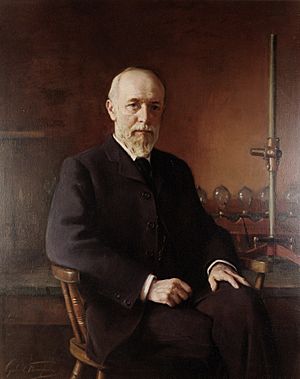Ernest Howard Griffiths facts for kids
Quick facts for kids
Ernest Howard Griffiths
|
|
|---|---|

Portrait by Gabriel Thompson
|
|
| Born | 15 June 1851 |
| Died | March 3, 1932 (aged 80) |
| Awards | Hughes Medal (1907) |
| Scientific career | |
| Fields | Physics |
Ernest Howard Griffiths (born 15 June 1851 – died 3 March 1932) was an important British scientist. He was born in Brecon, a town in Wales. Griffiths was a physicist, which means he studied how energy and matter work.
He was recognized for his scientific work in several ways. In 1895, he became a Fellow of the Royal Society. This is a very special honor for scientists in the UK. Later, in 1907, he received the Hughes Medal. This award is given for important discoveries in physics. Ernest Howard Griffiths was also related to a famous person from history. On his mother's side, he was a descendant of Robert Blake, a well-known admiral from the 1600s.
His Career and Roles
Ernest Howard Griffiths held several important jobs during his life. These roles show how much he contributed to education and science.
Leading a University
In 1901, Griffiths became the principal of the University College of South Wales and Monmouthshire. This university is located in Cardiff, a major city in Wales. As principal, he was like the head of the university. He also became a professor there. His special field was called "experimental philosophy." This term was used in the past for what we now mostly call physics, especially when it involved experiments.
Connection to Oxford University
Griffiths also had a special link to Jesus College, Oxford. He was a Fellow at this famous college in different years: 1905, 1909, 1913, and 1917. This was part of a system where leaders from Welsh universities would take turns being a Fellow at Jesus College. It helped connect the universities in Wales with Oxford.

